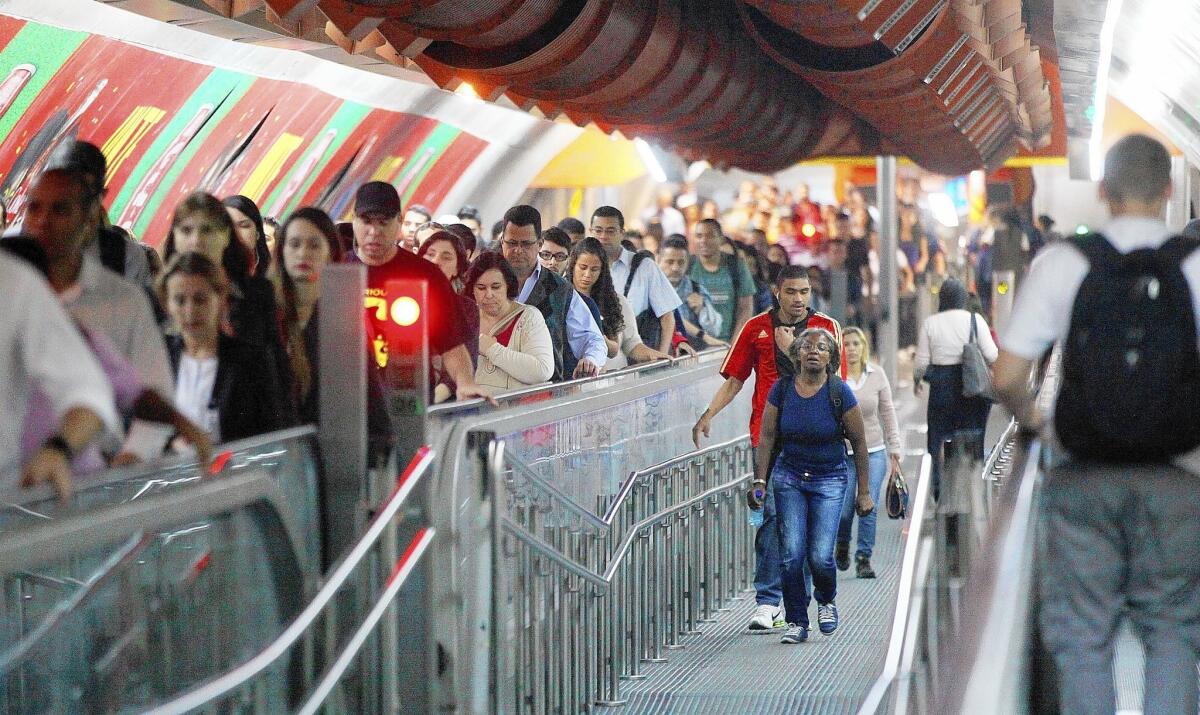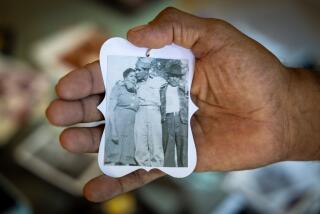For Brazil’s new middle class, life’s still a struggle

- Share via
Reporting from Sao Paulo, Brazil — When soccer’s World Cup tournament kicks off Thursday in Brazil, it will mark a crowning moment in a campaign for respect built largely on the country’s economic progress over the last decade, especially in lifting 40 million people out of poverty.
Many have left the daily struggle for survival behind in recent years, to focus on a steady job and hope for a better future.
But here is what it often means to be part of this new middle class:
Juan Brito Rocha, a 22-year-old scholarship student, lives with his parents and three brothers in a run-down high-rise with holes in the concrete walls where the family is trying to improve the electrical service. The brothers, ranging in age from 15 to 25, sleep in bunk beds in one tiny bedroom and share clothes.
The building is surrounded by slums so tough that when a thief fell off his motorcycle recently, the students he had robbed beat him to death. The threat of violence is constant.
And attending a World Cup game is out of reach.
Life has improved since the days when the family lived on an unwanted bit of land, a “ghetto before you could even call it a ghetto,” in the words of Juan’s father, Davi da Silva Rocha. A combination of hard work and government help has been crucial.
Experts say the prospects of these newly empowered Brazilians with household incomes between $775 and $3,400 a month are crucial to a country of 200 million people that long has suffered from vast discrepancies in wealth. They now make up more than half the population but still face limitations everywhere.
Transportation, schools, healthcare and police are major sore spots. The country over the last year has been mired in protests by citizens complaining that officials have overspent on the World Cup and neglected more pressing needs. Those who have recently emerged from poverty are among the most vocal critics.
“Life is better, in that there is more access to housing, to material goods. Maybe people can dress a little better,” said the elder Rocha, who worked his way out of the slums to a stable job as an accountant’s assistant. “But there is so much more that needs to be done.”
For his son Juan, a star student who earned a scholarship to a private university, choices have been limited by the difficulty of getting to class and the need to supplement the family income.
Traveling the 12 miles to school took 2 1/2 hours, starting at 4:30 a.m., to walk though dark, dangerous streets, sweat on crowded buses and then push into jammed subway cars. After class, his job as a waiter paid him just $330 a month and kept him out until 11 p.m.
“That just doesn’t work,” he said. “I had to quit.” He has dropped his studies in international relations and switched to civil engineering at another university closer to home. But in engineering, too, there are no immediate guarantees.
His older brothers’ prospects are even more limited. The oldest makes $450 a month delivering room service at a hotel; the second earns $800 a month making deliveries on motorcycle — jobs with little chance for advancement. The youngest is still in high school.
With the money they earn, the brothers pay for their own food, transportation and clothes. For everything else, they depend on their father’s pay of $1,250 a month. In a city where prices often match those in the most expensive metropolitan areas of North America, there is no money left at the end of the month. There might be if their mother, Erica Brito Rocha, gets a teaching position after finishing her education. It would be her first job as a professional.
As tough as it is, it represents an improvement. And it gives millions of people a taste for something more.
“The so-called new middle class is composed of people who previously had no access to any material goods and were basically excluded from society,” said Laurindo Leal Filho, a sociologist at the University of Sao Paulo. Now, he said, they might have job stability, limited means and a shot at higher education.
“This group is without a doubt the most important in Brazil, politically and economically,” Filho said. “Now that they have some consumer power, they’re making new demands for better public services, and the wave of protests here reflect that.”
The family knows what it means to be on the margins of society. Decades ago, Davi Rocha’s parents came to Sao Paulo from the poor northeast in search of work. That wave of migration included millions of people and led to the creation of most of Brazil’s favelas, or slums. They settled on a tiny plot of land far from the city center, and his father got a job as a security guard. One of Davi’s brothers was slain on the construction site where he worked.
Although they lived just 60 miles away, seeing one of Brazil’s famous beaches was unattainable. “No one had been there,” Juan Rocha said.
But then the family got lucky. Chosen for government-subsidized housing in 1998, they moved to the high-rise and paid a small amount for rent until Rocha cashed in his retirement savings to buy the place.
Government programs have helped in other ways. The nearby neighborhood center provides a library and a public pool. A teacher, who saw the potential of the youngest son, Davi Jr., directed him away from an especially troubled school.
“She told me that the school doubled as a drug market during recess,” said his mother. “When I asked her why she let that happen, she said if she didn’t, the traffickers could kill her.”
Juan said that recently thieves attacked students coming out of the school, and as they rode off, one fell from his motorcycle. “The others left him, and the kids beat him until he died,” he said.
Turning to police, who are widely accused of corruption and abuses, is rarely an option.
“The right word, I think, is ‘mistrust,’” said Rocha. “We don’t know if they’re up to no good, or if they are one of the decent ones.”
Like much of Brazil, the family is also split on the World Cup. Even though they acknowledge that money was misspent, the parents are excited by it.
“The World Cup is important for Brazil and for sports,” said Erica. “But the country isn’t prepared in terms of infrastructure. The Brazilian people will welcome visitors with love, but I wish that money had gone to our local health system. You go into our local clinic, you’ll be there at least four hours.”
Juan said he is disgusted by the amount of money dedicated to sports, including the salaries of players who started poor and worked their way up from the streets. He prefers studying.
Even if he wanted to go to the opening game Thursday between Brazil and Croatia, he couldn’t afford it. The cheapest discounted ticket for local people would be about $80. On the secondary market now, there is nothing for less than $2,000.
And then, there would be the nightmare of getting to the stadium on the decrepit public transportation network. How long would that take?
“Impossible,” Juan said, laughing. “OK, at least four hours.”
Bevins is a special correspondent.
More to Read
Sign up for Essential California
The most important California stories and recommendations in your inbox every morning.
You may occasionally receive promotional content from the Los Angeles Times.













